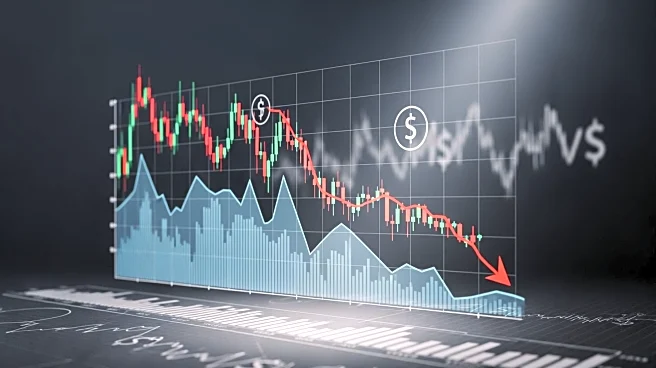What's Happening?
Global financial stocks experienced a significant downturn as concerns over U.S. credit quality and mounting risks in the banking sector intensified. The selloff was triggered by the exposure of banks
to two recent U.S. auto bankruptcies, which raised questions about lending standards. This development comes more than two years after the failure of Silicon Valley Bank, which was affected by high interest rates leading to paper losses on its bonds. The ripple effect of the selloff was felt across Asia and Europe, with major European banks like Deutsche Bank and Barclays experiencing substantial losses. In the U.S., the SPDR S&P regional banking ETF saw a notable decline, and shares of Zions Bancorp, a focal point of investor scrutiny, also fell. The situation was exacerbated by Zions Bancorp's announcement of a $50 million loss on loans and Western Alliance's lawsuit alleging fraud, which further unsettled investors.
Why It's Important?
The downturn in global bank stocks highlights the fragility of the financial sector and the potential for broader economic implications. The exposure of banks to credit risks and the subsequent selloff underscore the vulnerabilities in lending practices and the private credit market. Investors are concerned about the possibility of contagion, reminiscent of past financial crises where regional bank issues led to global stock market declines. The situation is compounded by high valuations in equity markets, making investors wary of potential corrections. The impact on major tech stocks, which fell more than banks, indicates broader market apprehension. Additionally, the rising default rates in private debt and weakening investor protections suggest larger losses on defaults, posing further risks to the financial system.
What's Next?
Investors and financial institutions are likely to closely monitor developments in the U.S. credit markets and the banking sector's response to these challenges. The potential for further credit impairments and defaults in private debt could lead to increased scrutiny and regulatory attention. Market participants may also watch for any policy responses, such as interest rate adjustments, to stabilize the situation. The broader economic impact, including potential trade tensions between the U.S. and China, could influence market dynamics. As investors assess the risks, there may be a shift towards safe-haven assets, impacting currency and commodity markets.
Beyond the Headlines
The current situation raises questions about the sustainability of the AI-led stock market surge and the broader implications for financial stability. The weakening of covenants and investor protections in private credit markets could lead to larger losses, challenging the resilience of the financial system. The focus on credit quality and lending standards may prompt a reevaluation of risk management practices within banks. Additionally, the geopolitical dimension, including U.S.-Chinese trade tensions, could further complicate the economic landscape, affecting global trade and investment flows.









